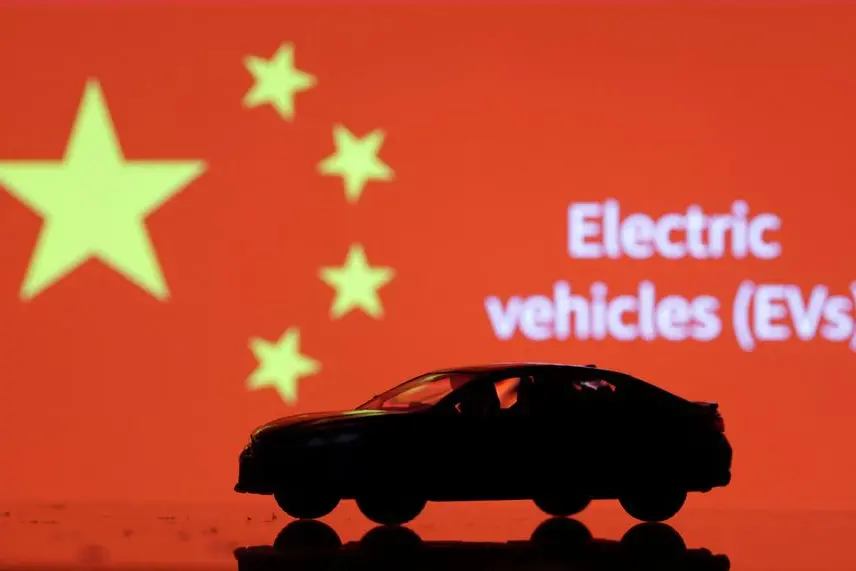PHOTO
OTTAWA: Canada, following the lead of the United States and European Union, said on Monday it will impose a 100% tariff on imports of Chinese electric vehicles and announced a 25% tariff on imported steel and aluminum from China.
The duties apply to all EVs shipped from China, which would include those made by Tesla, a Canadian government official said.
Shares of the most valuable global automaker closed down 3.2%.
Canadian imports of automobiles from China to its largest port, Vancouver, jumped 460% year over year to 44,356 in 2023, when Tesla started shipping Shanghai-made EVs to Canada.
Prime Minister Justin Trudeau said Ottawa was acting to counter what he called China's intentional, state-directed policy of over-capacity. "I think we all know that China is not playing by the same rules," he told reporters. The tariffs will be imposed starting Oct. 1.
"What is important about this is we're doing it in alignment and in parallel with other economies around the world," Trudeau said on the sidelines of a three-day closed-door cabinet meeting in Halifax, Nova Scotia.
The Chinese embassy in Canada called the move "protectionist" and a "politically dominant act", adding that Canada has ignored World Trade Organisation (WTO) rules.
Canada's action will undermine normal economic and trade cooperation between the two countries and hurt Canadian consumers and enterprises, a spokesperson for the embassy said in a statement released late Monday.
"The Canadian government insisted on announcing tariffs on Chinese electric vehicles in disregard of China's repeated objections and solemn representations," the spokesperson said.
"China urges Canada to respect objective facts, abide by WTO rules, immediately correct its erroneous practices, and refrain from politicizing economic and trade issues."
China is Canada's second-largest trading partner, although it trails far behind the United States.
Tesla does not disclose its Chinese exports to Canada. However, vehicle identification codes showed that the Model 3 compact sedan and Model Y crossover models were being exported from Shanghai to Canada.
"It is a 100% surtax on all Chinese-made EVs. If companies currently making vehicles in China choose to move their production to a different country, they would no longer be captured by this tariff," the government official said.
Tesla did not immediately respond to a request for comment.
US IMPORTS AN ALTERNATIVE
"In response to the tariffs, I would expect Tesla would shift its logistics and potentially export autos to Canada from the U.S.," said Seth Goldstein, equity strategist at Morningstar.
"The market is likely reacting to the tariffs and weighing a potential profit impact if Tesla has to export vehicles to Canada from its higher-cost production base in the U.S.," Goldstein said referring to the drop in shares.
The EU softened its stance on Tesla this month when it imposed tariffs on Chinese-imported EVs and imposed a rate of 9% for Tesla, lower than the up to 36.3% it had imposed on other Chinese EV imports.
FURTHER MEASURES
Ottawa will continue to work with the United States and other allies to ensure that customers around the world are not unfairly penalized by non-market practices of countries such as China, Trudeau said.
Ottawa is looking at further punitive measures such as tariffs on chips and solar cells, Trudeau said, without giving details.
China's top imports from Canada last year consisted of around $4 billion worth of petroleum, $3.5 billion of rapeseed, and just over $2 billion in iron ore, in addition to almost $14 billion of non-monetary gold, Chinese customs data shows.
The world's largest agriculture importer also bought in sizeable quantities of numerous other crops and commodities, giving Beijing options were it to retaliate, as it has done with the EU.
Canada is not among the top 10 export destinations for Chinese steel and aluminium.
U.S. President Joe Biden in May announced a quadrupling of tariffs on Chinese electric vehicles to 100%, a doubling of duties on semiconductors and solar cells to 50%, as well as new 25% tariffs on lithium-ion batteries and other strategic goods including steel, to shield firms from Chinese excess production.
Ottawa is trying to position Canada as a critical part of the global EV supply chain and had come under pressure from domestic industry to act against China.
Canada has inked deals worth billions of dollars to attract top European automakers in all parts of the EV supply chain.
"We feel vindicated and motivated. Let's now get to the business of defending our market with the best of Canadian innovation and resolve," Flavio Volpe, president of the Automotive Parts Manufacturers' Association, said via email.
Implementation of the U.S. tariffs has been delayed until September and there is a possibility that planned duties might be softened this week. (Reporting by Promit Mukherjee, additional reporting by Bernard Orr and Joe Cash in Beijing; Editing by Rod Nickel and Stephen Coates)





















